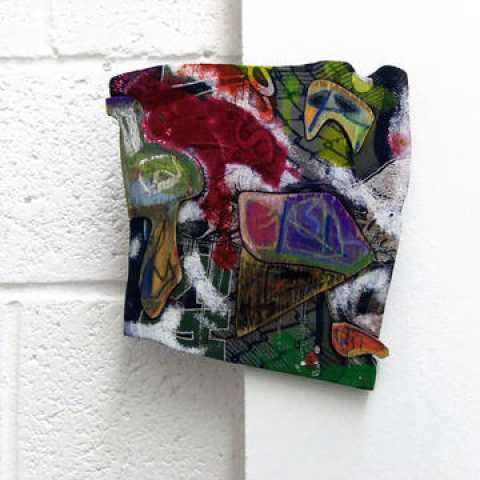WELCOME SCREEN
20 Felstead Street, Oslo House, West Wing, UNIT 1E,
London
E9 5LT
United Kingdom

'Not taking things, people, and places for granted,†is the modest philosophy that underpins Keith Allyn Spencer's work, and encompasses not only his use of found materials, but also his exploratory approach to documenting and installing his work, as well as his belief in the power of the work over that of the artist. A childlike sense of discovery and experimentation is revealed in the act of creation, recording and display that calls into question the nature of painting itself. There is a humour and playfulness present: abandoned 'Angry Birds' underwear is stretched across and interspersed with wooden surfaces; canvases are worked backwards; photographs of the paintings also become artworks.
Spencer delights in 'disrupting the everydayâ€. His works may appear at first as haphazard jigsaw puzzles of found objects: 'Preferably, materials find me: paint tubes abandoned from students r used as pigments, t-shirts left behind on basketball courts utilized as canvas, and plywood boards covering potholes r scavenged for stretchers.†Although the piecing together of the paintings appears random, there is a deliberation and sense of purpose: objects and materials are in fact selected and combined, 'It's not enough to just roll that boulder down tha hill and fully embrace what's left of it w/out determining which hill and which boulder to use 1st.†The paintings are created from the front to the back in an interrogation of painting's form; the artwork is often re-stretched and reworked several times over in order to construct what he has referred to as 'weird little objects with unknown powers only to be revealed later.â€
Spencer depends upon these 'unknown powers' when vindicating his own production. The small scale of his work and preoccupation with the unwanted, suggest a self-effacement not often present in contemporary art's cult of the personality. Spencer has admitted to a conflict of usefulness; his usefulness to society as an artist; the usefulness of re-purposing discarded objects versus the uselessness of art in a world full of need: 'I have 2 forcibly ignore my guilt n order to merit my art makingâ€. However he retains a - somewhat humble and unstable - belief in the transformative power of engaging with art, 'What I really want is for these works to directly move others into constructive action. Do not ask me how.â€
Despite this predicament, Spencer enjoys 'the freedom to make paintings about paintingsâ€, rejecting the labeling of his art as 'abstract' or message-laden. 'Art is used to isolate the everyday†claims the artist, and more so in his work than most - not solely due to the use of everyday materials but also in his constant questioning of art's presence and the viewer's experience of it. The experience of creation and viewing are intended to surprise, and Spencer is known for displaying his work in public places; shops, restaurants, post offices, without permission and with the hope that they will be taken down and moved; handled by the viewer. There lies an inherent contradiction within these small, tightly-worked puzzles of paintings that embrace the accidental: 'Unexpected consequences are welcomed while retaining total control.†For Spencer's first exhibition outside of the USA WELCOME SCREEN offers a more formal gallery setting, but one that is simultaneously new, experimental and unexpected. - Text by Anneka Hartley
